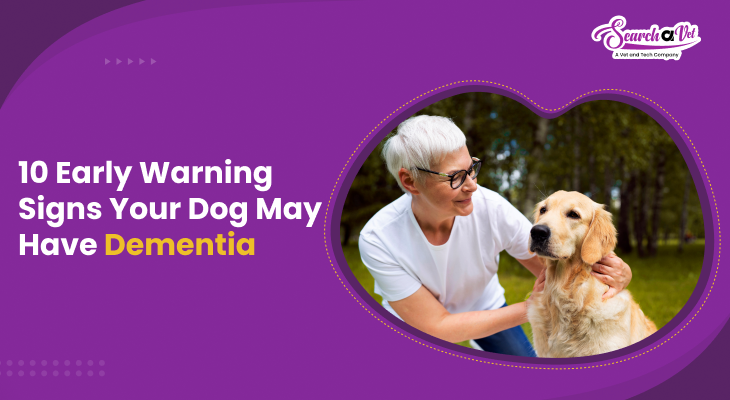10 Early Warning Signs Your Dog May Have Dementia
 Oct 24, 2024
Oct 24, 2024

Like humans, as dogs grow older, they are more prone to health complications and need extra care.
There is no need to worry about your dog’s age because dogs are active by nature and overcome many health problems with this trait. However, if your doggy displays concerning behaviors such as disorientation or confusion, it might suffer from canine dementia.
Dementia is a serious condition that affects dogs' mental functions. Like in humans, it causes memory loss, confusion, and changes in behavior.
Early detection can make a huge difference in managing the condition.
In this blog, you will learn in detail about:
- 10 warning signs of dementia in dogs
- Actions you need to take after noticing these signs
- How to manage dementia in dogs
- Common preventative measures
10 Early Signs for Dementia in Dogs
The sooner you treat the symptoms of dog dementia, the higher the quality of life your pet will have. For an effective treatment plan, a relationship with a vet should also be maintained through virtual communication or in-person visits.
Before visiting a veterinarian, review the 10 early signs of dementia in dogs below in detail.
1. Disorientation or Confusion
Confusion is one of the distinct features of dementia in dogs before actual disorientation. Your dog may seem confused when it is in familiar places/environments, and it may take time to find where it goes.
However, if it begins to roam aimlessly or remain trapped behind pieces of furniture, then it is time to pay attention.
- Frequently gets stuck behind objects or in corners
- Wanders aimlessly around the house
- Appears lost in familiar places
- Difficulty recognizing familiar people or pets
- Disoriented during walks or trips outside
2. Changes in Sleep Patterns
Dogs with dementia often experience disruptions in their sleep cycles. They may stay awake at night, pacing or whining, while sleeping more during the day.
This change in routine can be a major sign that something isn’t right.
- Increased nighttime restlessness
- Excessive sleeping during the day
- Frequent pacing or wandering at night
- Inability to settle down for sleep
- Whining or barking during the night
3. Altered Interactions with Family Members
A dog with dementia may show less interest in interacting with its family. It may no longer greet you at the door or respond enthusiastically to your name.
Over time, its affection may decrease, leaving it detached.
- Less responsive to their name
- Decreased excitement when family members come home
- Reduced desire for physical contact or affection
- Avoids playing or socializing with other pets
- May seem more distant or withdrawn than usual
4. Increased Anxiety or Restlessness
Anxiety is another key symptom. Dogs may become more restless and anxious, especially at night. They may start pacing, panting, or becoming overly attached to you.
You will notice:
- Sudden attachment or separation anxiety
- Pacing or wandering around without a clear reason
- Excessive panting even when not exerting themselves
- Sudden fear of familiar objects or environments
- Restlessness, especially during the evening or nighttime
5. Loss of House Training: Dementia in Dogs
A previously house-trained dog with dementia may start having accidents inside the home. If your dog frequently urinates or defecates indoors, it could be a sign of dementia.
You will observe:
- Urinates indoors despite being house-trained
- Forgets to signal when they need to go outside
- Frequent accidents in unusual places, like their bed
- Appears confused when trying to find the door
- Loses control of bowel or bladder functions without realizing
6. Forgetting Commands or Tricks
Does your dog suddenly seem to forget the commands they used to know? Dog dementia symptoms often include memory loss, which makes it harder for them to recall tricks or basic instructions. If your dog starts ignoring basic cues like "sit" or "stay," this might be a red flag.
You will see:
- Struggles to follow basic commands they used to know
- Ignores cues like "sit," "stay," or "come"
- Fails to respond to previously learned tricks
- Takes longer to learn new instructions
- May appear confused when given simple commands
7. Decreased Activity Levels
A once-active dog may show less interest in physical activities like walking, playing, or exploring. Their energy may drop significantly, which could indicate cognitive issues.
What’s considerable to notice:
- Reduced interest in playing or exercising
- Frequently lying down or appearing tired
- Disinterest in walks or outdoor activities
- Slower movements or hesitating to run and play
- Lack of curiosity about their surroundings
8. Repetitive Movements
Dogs with dementia often develop repetitive behaviors, like pacing in circles or licking the same spot over and over.
This compulsive behavior can be frustrating to observe, but it’s a common symptom of cognitive decline.
Others include:
- Pacing in circles without stopping
- Repeatedly licking the same area on their body
- Barking or whining at the same time every day
- Walking the same path in the yard or house
- Constantly checking the same spots for no apparent reason
9. Difficulty Navigating Stairs or Furniture
As dementia in dogs progresses, your dog may struggle to navigate stairs, jump on furniture, or find their food bowl. Their coordination may decline, leading to frequent stumbling or hesitation.
Here’s what you’ll notice:
- Struggles to climb stairs or jump onto couches
- Hesitates before stepping over small obstacles
- Frequently trips or stumbles over everyday objects
- Appears confused when trying to reach food or water bowls
- May avoid going up or down steps entirely
10. Changes in Appetite or Thirst
Your dog might either lose interest in food or start drinking excessive amounts of water. This change in appetite or thirst could be tied to their cognitive dysfunction and should be monitored closely.
- Eats less than usual, even with favorite foods
- May overeat or beg for food constantly
- Drinks water more frequently than usual
- Shows less excitement about feeding times
- Has trouble locating or recognizing their food bowl
How to Prevent Dementia in Dogs
However, it is possible to reduce the risk of dementia in your dog through various activities.
- Eliminate exposure to toxins
- Consider brain-healthy dog dementia supplements
- Play games together
- Teach them new tricks
- Make sure they get regular exercise
- Feed them a balanced, whole-food diet
- Allow them to have new experiences & regular socialization
- Avoid putting your dog in stressful situations
What to Do if You Notice These Signs
If your dog shows any of these warning signs, it’s important to consult a veterinarian.
Early diagnosis can slow the progression of dementia in dogs. A vet will guide you through treatment options and lifestyle changes.
Try Search a Vet for Online Veterinarians Appointment
If you notice dog dementia symptoms, the next step is to contact a veterinarian. You can easily access Search a Vet for online veterinary appointments and consultations that can provide the necessary help your dog needs.
Managing Dog Dementia
So far there is no complete treatment available for dementia in dogs. However, there are multiple treatment options existing that can improve the dog's quality of life.
Here are some options:
Medications
- Prescription drugs slow cognitive decline.
- Improve sleep and reduce anxiety.
- Regular vet check-ups for monitoring.
- Adjust dosages based on progress.
Dietary Changes
- Omega-3 fatty acids boost brain health.
- Antioxidants combat brain aging.
- Supplements like phosphatidylserine aid memory.
- Balanced diet supports overall wellness.
Enrichment Activities
- Puzzle toys stimulate the mind.
- Regular walks increase brain activity.
- New toys prevent cognitive stagnation.
- Physical play sharpens mental skills.
To Sum Up
Dementia in dogs is a challenging condition, but recognizing the early signs can make a significant difference in your dog's life. From disorientation to changes in behavior, staying vigilant and proactive is essential.
If your dog displays any of the symptoms mentioned, use the Search a Vet platform to connect to top veterinarians, animal hospitals, and veterinary clinics, enabling easy online appointments and consultations on a single platform.
Don’t wait until your dog’s dementia gets irreversible; use Search a Vet and find suitable veterinarians to treat your dog.
FAQs
How do I know if my dog has dementia?
You may deem that your dog has dementia. If you suspect early signs, such as;
- Confusion
- Altered sleep patterns
- Loss of house training, and
- Cognitive decline
As soon you notice this behavior, quickly consult a veterinarian for tests and observations.
Are there any dog dementia supplements available?
There are various dog dementia supplements that can improve the dog's quality of life. The supplement contains phosphatidylserine, omega-3 fatty acids, and antioxidants that help promote brain health.




